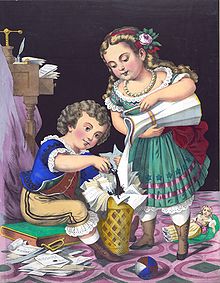- Mischief
-
Mischief is a vexatious or annoying action, or, conduct or activity that playfully causes petty annoyance. Young children, when they hear of mischief, think of practical jokes.[1]
The etymology of the word comes from Old French meschief, which means "misfortune,' from meschever, "to end badly." The term ‘mischief’ tends to minimize or play down the extent or seriousness of the violence often associated with the attacks.[2]
In United States criminal law, mischief is an offense against property that does not involve conversion. It typically involves any damage, defacement, alteration, or destruction of property. Common forms include vandalism, graffiti, or some other destruction or defacement of property other than arson. Governed by state law, criminal mischief is committed when a perpetrator, having no right to do so nor any reasonable ground to believe that he/she has such right, intentionally damages property of another person, intentionally participates in the destruction of property of another person, or participates in the reckless damage or destruction of property of another person.[3] Criminal mischief is usually a misdemeanor.
In computer science and hacker jargon, mischief is a form of attack that clearly indicates the breach of the system and constitutes a form of injury or an infringement of rights, more specifically invasion of privacy, against which legal action can be taken to secure damages. Grey hat hackers often use mischief as a way to signal security breaches to system administrators.
Mischief is also a way for hackers to "prove" themselves to others. As an overt demonstration to other hackers of their skill in the use of force, these security breaches can be taken as a sign of criminal intent and may result in charges as serious as terrorism.[4] In this context, terroristic threat involves a threat to commit violence (the computer attack) communicated with intent to cause significant harm, inconvenience, or injury (the resulting breach) in reckless disregard of the risk of causing such harm, inconvenience, or injury. Brute force is associated with hacker ‘mischief’.
Animal Life The term mischief also refers to a group of pet, domestic rats. A mischief is a community family of rats ranging from any age or size, but only pertaining to those kept as pets. If wild species of rats are involved, it is referred to as a colony.
References
- ^ http://dictionary.reference.com/browse/mischief
- ^ http://64.233.179.104/scholar?hl=en&lr=&q=cache:KXQXUlaS4_sJ:www.journal.law.mcgill.ca/arts/411shaff.pdf+criminal+mischief+violence+assault
- ^ reckless legal definition of reckless. reckless synonyms by the Free Online Law Dictionary
- ^ Terroristic Threat Law & Legal Definition
Categories:- Vandalism
- Crime stubs
Wikimedia Foundation. 2010.

